Piling &
Foundation Drilling
Expertise in complicated
geotechnical and
construction drilling.
Building a good foundation is essential in any construction project. But tight deadlines and complicated urban environments set challenges to contractors working in the field.
At Mincon we work hard to ensure that each of your foundation projects is finished safely, on time and on budget. This is possible with our DTH drill string consumables offering class-leading performance and safety in complex environments.
Our patented Spiral Flush air control technology makes drilling in the overburden and tight urban spaces safe, and the wide variety of our casing systems can be delivered in sizes from 114 mm (4.5”) to 1,524 mm (60”) with the option of having custom project-specific systems manufactured in our own factory.

Building a good foundation is essential in any construction project. But tight deadlines and complicated urban environments set challenges to contractors working in the field.
At Mincon we work hard to ensure that each of your foundation projects is finished safely, on time and on budget. This is possible with our DTH drill string consumables offering class-leading performance and safety in complex environments.

Designed and tested
in the hardest conditions on Earth
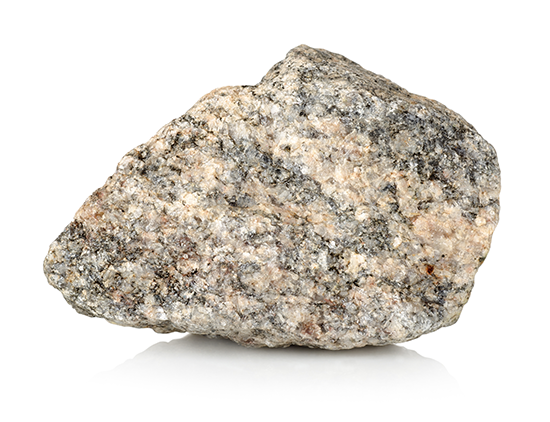
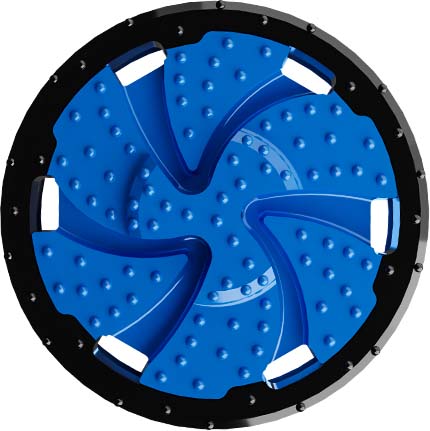
Airflow
controlled
The high-pressure air that is used to operate DTH hammers and flush the cuttings from the drill hole, can reach up to 24 bar (348 PSI). This can put a lot of pressure against the soil, if the airflow is directed straight against it, resulting in over-drilling and underground cavities.

Mincon has developed a patented solution, called Spiral Flush, that eliminates the risk of air escaping into the wrong places. Spiral Flush makes drilling in sensitive and complex ground conditions safe by not directing airflow against the ground.
Why go
down-the-hole?
When building foundations of a construction, like a building or a bridge, impact and vibration driven piles work well in soft overburden. Bored piles (”Kelly piles”) are also convenient when building large-diameter piles in easy overburden. But the problems start if these types of piles hit any rocky layers. Impact and vibration driven piles simply stop and the progress of bored piles slows down significantly. And boring into bedrock becomes painfully slow.
On the other hand, when using down-the-hole or DTH tooling, piles are drilled with a DTH hammer which literally goes into the hole and uses high-pressure air as its power source. The air moves a piston up and down which, in turn, strikes a pilot bit against the rock. This high frequency hammering with rotating movement crushes any rocks that come in the way.
Predictable. Reliable. Fast.
The same high-pressure air is then used to flush the cuttings up from the hole. This is a continuous process that allows fast penetration into overburden and bedrock. Also, as the hammer is always close to the action at the bottom of the hole – unlike in top hammer design – the drilling is efficient even in deep holes. DTH drilling is also suitable for large-diameter drilling up to diameters of 1,524 mm (60”). All these features mean that the building process is predictable. You know already beforehand how much it costs to drill DTH piles. It also means reliability that the drilling progresses, no matter what is hidden underground. And when all can be done with the same drilling rig with Mincon’s efficient DTH hammers and Spiral Flush pilots, it all comes down to speed. You get things done fast.
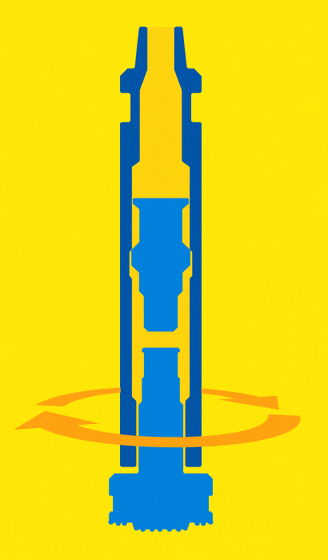
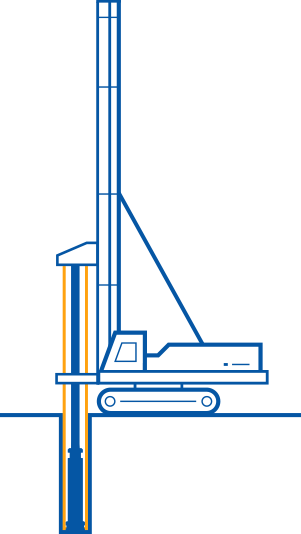
Why go
down-the-hole?
When building foundations of a construction, like a building or a bridge, impact and vibration driven piles work well in soft overburden. Bored piles (”Kelly piles”) are also convenient when building large-diameter piles in easy overburden. But the problems start if these types of piles hit any rocky layers. Impact and vibration driven piles simply stop and the progress of bored piles slows down significantly. And boring into bedrock becomes painfully slow.


Predictable. Reliable. Fast.
The same high-pressure air is then used to flush the cuttings up from the hole. This is a continuous process that allows fast penetration into overburden and bedrock. Also, as the hammer is always close to the action at the bottom of the hole – unlike in top hammer design – the drilling is efficient even in deep holes. DTH drilling is also suitable for large-diameter drilling up to diameters of 1,524 mm (60”). All these features mean that the building process is predictable. You know already beforehand how much it costs to drill DTH piles. It also means reliability that the drilling progresses, no matter what is hidden underground. And when all can be done with the same drilling rig with Mincon’s efficient DTH hammers and Spiral Flush pilots, it all comes down to speed. You get things done fast.
Learn about
Mincon’s piling solutions
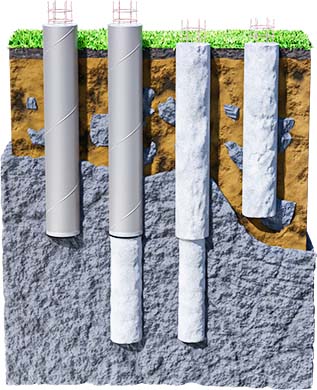
Piling
professional
Because project requirements vary greatly along with ground conditions, there are many different techniques for DTH drilled piles. Mincon, being one of the pioneers in DTH technology, has a solution for all of them. Despite our extensive selection of stock tools and methods, we understand that sometimes a project can be so unique that something different is needed. That’s why all Mincon DTH solutions can be fine-tuned based on specific project requirements together with the customer.
Because project requirements vary greatly along with ground conditions, there are many different techniques for DTH drilled piles. Mincon, being one of the pioneers in DTH technology, has a solution for all of them.

Despite our extensive selection of stock tools and methods, we understand that sometimes a project can be so unique that something different is needed. That’s why all Mincon DTH solutions can be fine-tuned based on specific project requirements together with the customer.
End-bearing piles
Used in projects where casings resting in bedrock are calculated to take part of the load together with the reinforced concrete. This way, the amount of rebar steel can be reduced.
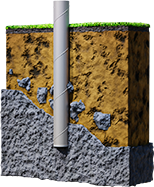
Sacrificed casing piles
with rock sockets
This is a modification of end-bearing piles for projects which have tensile loads as rock sockets have an excellent grip in bedrock.
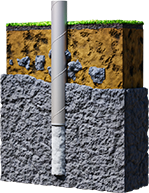
Retrievable casing piles
with rock sockets
Used in projects where tensile loads need to be considerd but load calculations don’t take casings into account. In these situations, it is better to lift and reuse the casings.
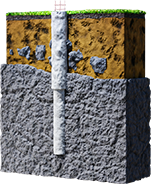
Drilled friction piles
When support from bedrock is not necessary or even available, drilled friction piles offer good grip as the wet concrete flows and dries in the small cavities of the soil.
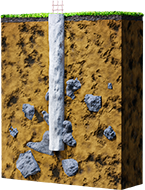
M-Wall piles
A retaining wall solution, which can do duty as a load-bearing foundation, rather than just a wall that prevents ground masses from collapsing. Can also be made watertight and used with variety of interlocks.
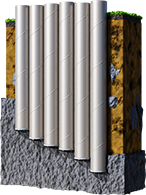
Our
casing systems
Piles are drilled using a DTH hammer and a suitable casing system. When the casing is drilled to the desired depth (1), the pilot bit is released by turning it backwards a little bit and then pulled up (2) and used again in the next pile.
For the best piling performance, use Mincon’s powerful DTH hammers and shock absorbers.
Piles are drilled using a DTH hammer and a suitable casing system. When the casing is drilled to the desired depth (1), the pilot bit is released by turning it backwards a little bit and then pulled up (2) and used again in the next pile.
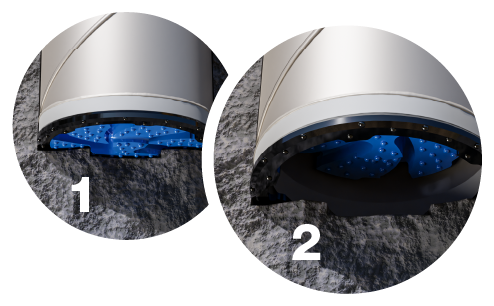
For the best piling performance, use Mincon’s powerful DTH hammers and shock absorbers.

Solitary system
The casing shoe and the ring bit are not permanently connected together at the factory. Uses the same double shoulder pilot bit as the large integrated system, including M-Wall systems. Learn more.
Integrated system, small
Sizes 114-301 mm (4.5”-11.9”). The casing shoe and the ring bit are securely connected together at the factory. This makes drilling over water safe, as you are not running the risk of accidentally dropping the ring bit into water. Uses a single shoulder pilot that is not compatible with the large solitary/integrated system. Learn more.
Integrated system, large
Sizes 323-1,524 mm (12.7”-60”). The casing shoe and the ring bit are securely connected together at the factory. This makes drilling over water safe, as you are not running the risk of accidentally dropping the ring bit into water. Uses the same double shoulder pilot as the solitary system, including M-Wall systems. Learn more.
Large ID system
The most recommended tool for creating rock sockets. The large inner diameter of the ring bit allows for the maximum size rock bit to be drilled through the ring bit. Learn more.
Drill through system
The pilot bit, after unlocking, can be drilled through the ring bit. This can save time in deep foundations that require rock sockets, by eliminating the need to replace the pilot with a separate rock bit. Learn more.
Retrievable system
The features on the ring bit have been designed to reduce the friction against the soil, allowing an easy retrieval of the casing. This way the ring bit can reused in the next pile. Learn more.
M-Wall solitary system
The extra large ring bit is designed so that it drills space for the casing interlocks. The ring bit is not permanently connected to the casing shoe which, in the hands of an experienced driller, is a very cost effective solution. Uses the same pilot bit as the integrated system. Learn more.
M-Wall integrated system
The extra large ring bit creates space for the casing interlocks. The ring bit is permanently connected to the casing shoe which makes drilling over water safe as there is no risk of accidentally dropping the ring bit into water. Uses the same pilot bit as the solitary system. Learn more.
Rock bit
The trusty work horse for going through rock of any hardness. In piling, it is used to drill rock sockets through large ID ring bits. Learn more.
We deliver
the size you need
All Mincon piling tools can be delivered in a wide range of sizes, from 114 mm (4.5”) to 1,524 mm (60”). They also use our patented Spiral Flush technology – a market-leading airflow control system that makes it safe to drill with compressed air in sensitive ground conditions.
Our experienced project engineers are here to help you to decide the most cost-effective piling solution, whether it includes our stock options or something customized for your project.
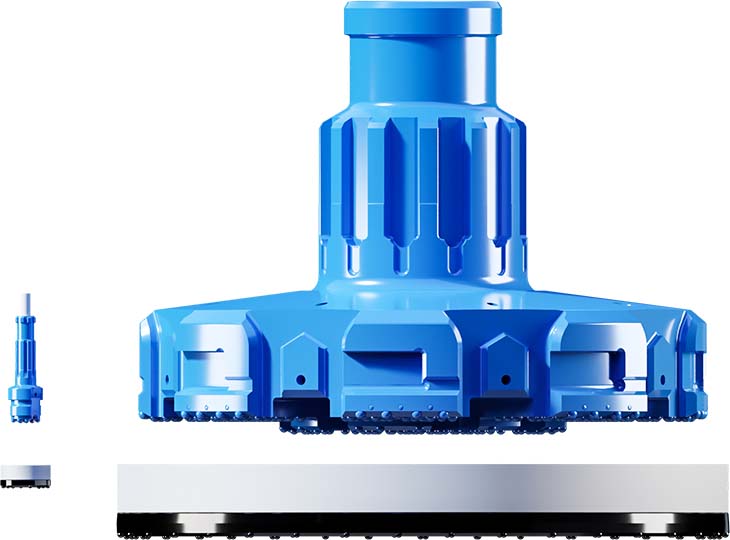
Choose
The Driller's Choice
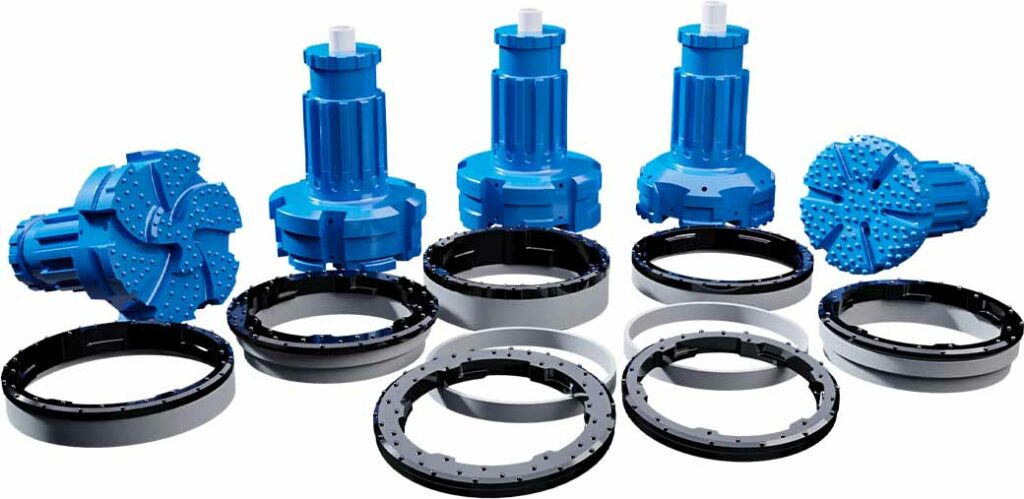
Contact Mincon Geotechnical Center for more information.
Proven technology
around the world
Mincon has delivered thousands of geotechnical piling solutions around the world. Our casing systems have played a vital role in the success of construction projects in Americas, Europe, Middle East, Africa and Asia Pacific.
One of the recently finished piling projects in North America set new world records for DTH drilled piles. These records include the biggest piles drilled with a drill-through (DT) system and the largest pile drilled with a single DTH hammer. Read more below about how Mincon was able to deliver 550 piles in tight schedule, the biggest ones using the 1,524 mm (60”) DT system.









